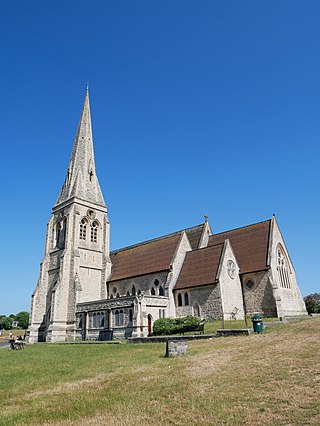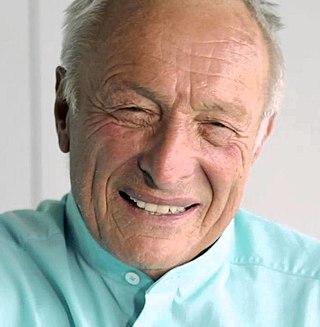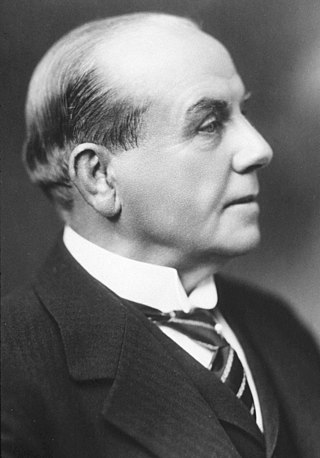
A lubricant is a substance that helps to reduce friction between surfaces in mutual contact, which ultimately reduces the heat generated when the surfaces move. It may also have the function of transmitting forces, transporting foreign particles, or heating or cooling the surfaces. The property of reducing friction is known as lubricity.

Blackheath is an area in Southeast London, straddling the border of the Royal Borough of Greenwich and the London Borough of Lewisham. Historically within the county of Kent, it is located 1-mile (1.6 km) northeast of Lewisham, 1.5 miles (2.4 km) south of Greenwich and 6.4 miles (10.3 km) southeast of Charing Cross, the traditional centre of London.

Louis Charles Joseph Blériot was a French aviator, inventor, and engineer. He developed the first practical headlamp for cars and established a profitable business manufacturing them, using much of the money he made to finance his attempts to build a successful aircraft. Blériot was the first to use the combination of hand-operated joystick and foot-operated rudder control as used to the present day to operate the aircraft control surfaces. Blériot was also the first to make a working, powered, piloted monoplane. In 1909 he became world-famous for making the first aeroplane flight across the English Channel, winning the prize of £1,000 offered by the Daily Mail newspaper. He was the founder of Blériot Aéronautique, a successful aircraft manufacturing company.

Motor oil, engine oil, or engine lubricant is any one of various substances used for the lubrication of internal combustion engines. They typically consist of base oils enhanced with various additives, particularly antiwear additives, detergents, dispersants, and, for multi-grade oils, viscosity index improvers. The main function of motor oil is to reduce friction and wear on moving parts and to clean the engine from sludge and varnish (detergents). It also neutralizes acids that originate from fuel and from oxidation of the lubricant (detergents), improves the sealing of piston rings, and cools the engine by carrying heat away from moving parts.
Westcombe Park is a largely residential area in Blackheath in the Royal Borough of Greenwich, South East London, England. It is bounded by the main London-Dartford railway line to the north, the Blackwall Tunnel southern approach to the east, the Blackheath common to the south and a road, Vanbrugh Hill, to the west.

Sir Alfred Fernandez Yarrow, 1st Baronet, was a British shipbuilder who started a shipbuilding dynasty, Yarrow Shipbuilders.

Richard George Rogers, Baron Rogers of Riverside was a British-Italian architect noted for his modernist and constructivist designs in high-tech architecture. He was the founder at Rogers Stirk Harbour + Partners, previously known as the Richard Rogers Partnership, until June 2020. After Rogers' retirement and death, the firm rebranded to simply RSHP on 30 June 2022.

Synthetic oil is a lubricant consisting of chemical compounds that are artificially modified or synthesised. Synthetic lubricants can be manufactured using chemically modified petroleum components rather than whole crude oil, but can also be synthesized from other raw materials. The base material, however, is still overwhelmingly crude oil that is distilled and then modified physically and chemically. The actual synthesis process and composition of additives is generally a commercial trade secret and will vary among producers.

A plain bearing, or more commonly sliding contact bearing and slide bearing, is the simplest type of bearing, comprising just a bearing surface and no rolling elements. Therefore, the part of the shaft in contact with the bearing slides over the bearing surface. The simplest example of a plain bearing is a shaft rotating in a hole. A simple linear bearing can be a pair of flat surfaces designed to allow motion; e.g., a drawer and the slides it rests on or the ways on the bed of a lathe.
Castrol Limited is a British oil company that markets industrial and automotive lubricants, offering a wide range of oil, greases and similar products for most lubrication applications. The company was originally named CC Wakefield; the name Castrol was originally just the brand name for CC Wakefield's motor oils, but the company eventually changed its name to Castrol when the product name became better-known than the original company name.

AMSOIL Inc. is an American corporation based in Superior, Wisconsin that primarily formulates and packages synthetic lubricants, fuel additives, and filters. Company founder Albert J. Amatuzio developed several synthetic motor oil formulations throughout the mid-to-late 1960s. He was commercially selling synthetic motor oil by 1968. In 1972, AMSOIL 10W-40 Synthetic Motor Oil became the world's first synthetic motor oil to meet American Petroleum Institute requirements, which prompted the company to adopt "The First in Synthetics®" as its tagline. The company introduced several other synthetic lubricants that represented industry firsts throughout the 1970s and early 1980s. It distributes products in North America via a network of independent dealers paid commissions on sales.

Mudchute Park and Farm is a large urban park and farm in Cubitt Town on the Isle of Dogs in the London Borough of Tower Hamlets, just south of Canary Wharf. It is a Local Nature Reserve and a Site of Metropolitan Importance for Nature Conservation.

Charles Cheers Wakefield, 1st Viscount Wakefield, GCVO, CBE, was an English businessman who founded the Castrol lubricants company, was lord mayor of London and was a significant philanthropist.

Sir Arthur McDougall Duckham was one of the founders of the Institution of Chemical Engineers, and its first president.

Thames Wharf Studios, in Hammersmith, London, was originally an industrial site containing the Duckham's oil facility overlooking the River Thames in Hammersmith. It was acquired by the Richard Rogers Partnership in 1983, which converted the industrial complex of redundant 20th century warehouses into offices, workshops, housing and a restaurant.

Vanbrugh Castle is a house designed and built by John Vanbrugh around 1719 for his own family. It is located on Maze Hill on the eastern edge of Greenwich Park in London, to the north of Blackheath, with views to the west past the Old Royal Naval College at Greenwich down to the Thames reaching as far as the Houses of Parliament.

GGB manufactures self-lubricating, prelubricated plain bearings and tribological polymer coating for various industries and applications. It has production facilities in the U.S., Germany, France, Slovakia, Brazil and China.
Shirley Ellen Schwartz or Ellen Shirley Schwartz was a chemist and research scientist at General Motors, specializing in the study and development of industrial lubricants and automobile oil change indicator systems. She was inducted into the Michigan Women's Hall of Fame in 1996 for her accomplishments in the field of chemistry.















